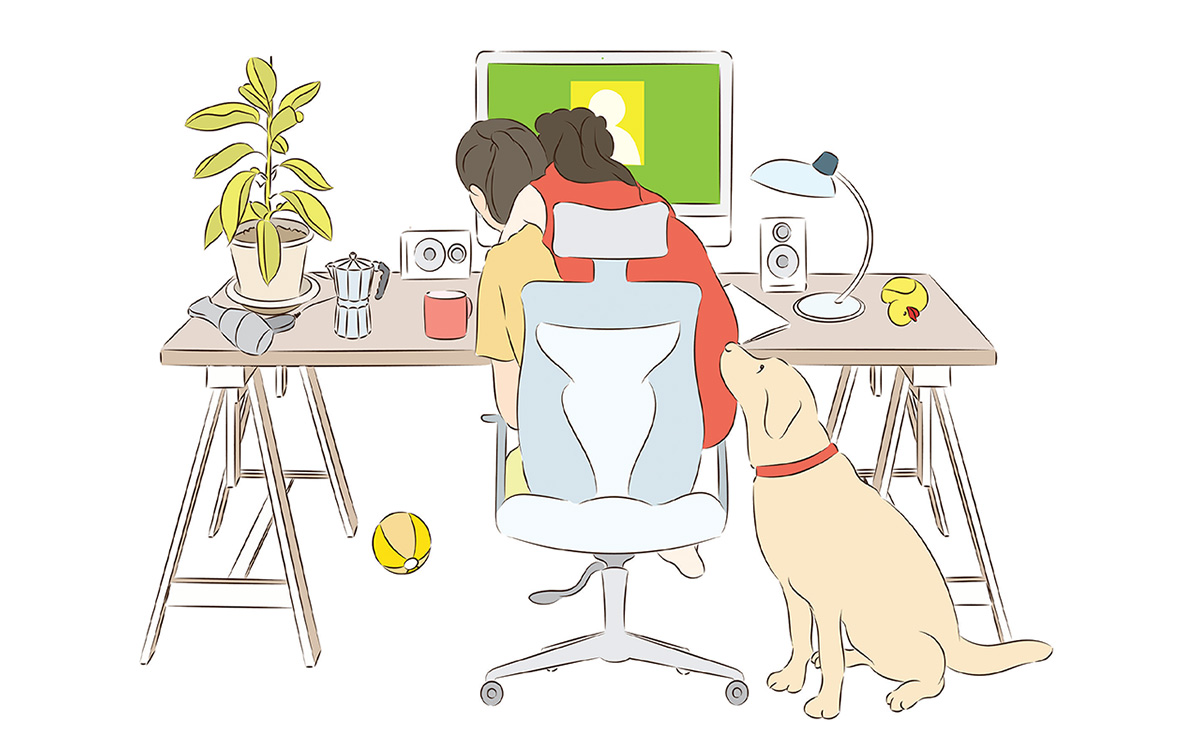Pandemic Parenting—How Foreign Service Moms Are (Not) Making It Work
FS parents—in particular, FS moms—are stretched to the breaking point, and there doesn’t seem to be an end in sight.
BY DONNA SCARAMASTRA GORMAN

MiloLabrador / Shutterstock
Since the early months of 2020, when the world shut down in the face of COVID-19, the impact on families has been unprecedented—especially on moms. Moms who were fortunate enough to have access to paid child care or nearby relatives lost that support when the world went on lockdown, and they left the workforce in droves, either because they were laid off or because they had to oversee their kids’ online schooling and the rest of the details that go into managing a household—no easy task even without a pandemic outside your door.
Most parents in the Foreign Service have stayed on the job, many remotely, but they haven’t been immune to the stresses of raising a family and managing a career while trying to avoid getting sick. It’s hard for Foreign Service families. We’re far from home, often in countries without quality health care. Our ability to access medevac flights if we get critically ill disappeared when borders closed. We can’t visit sick or dying relatives back in the States. Many of us moved to new countries midpandemic and have no nearby friends to lean on. And through it all, we’re juggling online school with spotty internet access, grocery shopping in foreign languages and near-impossible work deadlines.
FS parents—in particular, FS moms—are stretched to the breaking point, and with the vaccine still far from guaranteed to arrive at post, there doesn’t seem to be an end in sight. When the FSJ asked Foreign Service parents to tell us how the pandemic had affected their families and careers, numerous parents responded with their own stories from the trenches—and 100 percent of those responses were from working women.
“Stay Home and Watch Netflix”
“I’ve forgotten what downtime is,” says Jessica, an FS family member who works as a lawyer outside the embassy. Her husband’s job hasn’t slowed down—he’s at the embassy five days a week, 12 hours at a stretch—so she’s at home “juggling not only all of the regular child care duties, but also the virtual school responsibilities, all while trying to work from home at the same time.”
When people joked at the onset of the pandemic that all we had to do to beat COVID-19 was stay home and watch Netflix, she says it felt like a dagger in the chest. “The idea of being in my pajamas all day, eating chocolate chip cookies and watching Netflix is so luxurious, I have dreams about it. But instead, I'm running from my laptop to the kids, getting lunch on the table, keeping track of three different school schedules, plus my work calls. And trying to do all the regular stuff in between. No time for Netflix. I spend all of my time on work/kids/housework.”
An FSO based in Europe, whose husband has stayed home with the kids this tour, says: “He’s great at it, but we have two special needs kids and another with mental health struggles. He can’t do it all himself when they aren’t in school.” Since the start of the pandemic, she’s taken on more parenting duties, but she says her work has suffered as a result. “It’s incredibly hard to focus,” she explains. “I’m normally pretty good about being ‘work-me’ at the office and ‘mom-me’ at home, but it’s been hard to keep them separate.”
Senior-level FSOs aren’t immune. “The biggest change in terms of performance for me, as a relatively senior-level woman, leader and mother at an overseas post, is that I am no longer able to carry the emotional or social burden at work,” explains an FSO mom based at a post in South America. “Women at all levels often maintain the emotional and social intangibles that make an office a place where people feel connected, supported and recognized.” Now, she says, “I can gauge how focused I am on work by the relative increase in the number of notifications that the children are missing Zoom classes, assignments or online group meetings.”
Is it harder for parents serving overseas? Janet Moreth, a social worker with State’s Employee Consultation Services, says that Foreign Service parents “are facing many of the same pressures (i.e., virtual learning, lack of reliable child care and teleworking with young children present), but they’re doing it under complicated circumstances.” Moving between countries whose governments have different responses to the pandemic gives parents and children “mixed messages about expectations, protections and protocols,” causing anxiety and leading to socially awkward situations. Moreth is leading monthly parenting groups online for FS parents who need help navigating these murky waters.
The 1950s All Over Again?
It’s 2021. Women no longer have to resign if they get married, and spouses aren’t rated on their FSO’s annual employee evaluation report (EER). Yet many moms in heterosexual partnerships report that their children still turn to mom first, even when dad is at home. An FS specialist mother based in Europe reports that her kids usually come to her for help, even when she’s working and her husband is not. The mental burden on women, she says, is higher than ever.
Other moms agree. “The constant struggle over who deals with the kids, who manages them through the day at the expense of the parent’s own work, has been a major stressor on our marriage, especially after our transfer, when no one in the family has outside friends or support networks.” The solution for this FSO in South America (who prefers to remain anonymous) has been “for me to lead parent (and lean out of my work) so that my husband can lean in more to his job. This might mean a less awesome EER and maybe a change in my corridor reputation, but those things matter less than my family.”
“The State Department has so many talented, independent and resilient people but ‘doing it all’ is not sustainable,” says Janet Moreth, a social worker with State’s Employee Consultation Services.
“My husband comes to me snitching on the kids,” says one FS specialist. “‘So-and-so just did this!’ Well, dad, hubby, what are you going to do about it? Why are you telling me when I am clearly occupied with something else?”
Another mom whose partner spends long hours at the embassy says there is an expectation that because so many people work from home, there is more support at home. But “that just hasn’t been the case.” With her spouse still required to work full-time at the embassy, and no household help allowed in the houses at post, she’s on her own to manage their young children as they spend their school days in the dining room while she takes work calls in the same room.
Her situation is typical: FS families across the globe are feeling this pressure as the parents—mothers and fathers alike—try to find creative solutions that will allow them to make it through their pandemic days together, intact.
What to Do?
None of the moms this author heard from blame the State Department or any other agency for their predicament—in fact, nearly all mentioned that there is not much their employer could do to fix this situation. But one says she’d like to see management recognize that “this is all really hard on the spouses—especially those who transferred last summer and have no community at post. … So many of us have truly sacrificed to be here. It’s not easy on our families, on our careers, on our mental health. I worry about being away from my aging parents every day.”
Many others point to a need for technological upgrades, at work and at home. They recommend that the embassy upgrade at-home internet bandwidth to accommodate increased use by teleworking parents and distance learning students. “Give us the tech we need,” says one. “I need a monitor and a laptop I can use exclusively for work. I could spend $3,000 and buy a setup here; but I can’t really afford it, and I would spend twice as much buying locally.”
Married couples need to find ways to support one another. “In our dual career household, we try to specify specific times for each parent to assume primary parental duties during the workday to increase transparency and accountability in the allocation of household responsibilities,” says one FSO mom.
Another mom recommends that families “do what is right for them.” As she points out: “Most Americans have more annual leave than they can ever use, and we shouldn’t feel guilty for taking time that is ours.” We all like to feel critical to the mission, she says, but don’t let work overtake all areas of your life.
Jason Singer, AFSA’s USAID vice president, says AFSA encourages Foreign Service members to take advantage of the agency’s Staff Care and talk with their supervisors about work-life balance needs and flexibilities. “I’m a parent of two teenagers,” he says, and “these are not easy times. Speaking personally, I encourage my colleagues to recognize your own needs and take advantage of agency resources.” USAID officers are passionate about the mission, he says, and “this sometimes clouds our self-assessment of our own state of mind.” He encourages his colleagues to reach out to AFSA to discuss their challenges and seek support.
Make sure, too, that as a leader you are supporting your employees. Says one FSO: “State has, on paper, been great. The 10 hours of weekly COVID-19 leave, the incredible speed with which they set up telework capabilities, the messages of support. But at least for me personally, that hasn’t all been implemented. I’ve been strongly discouraged from using the COVID leave because ‘everyone will want to use it.’ I had to go back to the office long before the guidance indicated it was mandatory. Post ran out of laptops before I got one.”
Lean Too Far In, and You’ll Fall on Your Face
What do these parents want their colleagues and bosses to know? “I cannot be in charge of fostering morale or team building at work right now,” laments a senior-level FSO. “As lead parent with multiple kids learning full-time at home, plus elder care responsibilities, I just cannot take on more. I can’t be a rock star social sponsor. I can’t organize or confirm participation in optional virtual events. It’s a pity, because these contributions are integral to my leadership style and success, they reflect my core values, and leading these efforts is highly satisfying to me in normal times.”
Dr. Catherine Saxbe, a regional psychiatrist (RMO/P) based in Moscow, reminds parents that they can't “do it all.” “You can only toggle between the priorities of the moment,” she says. “Don’t stress about screen time or dust bunnies. But do pay attention so that family members don’t go and occupy separate silos all the time. Some alone time is fine and healthy, but sustained isolation is not, especially for children and teens. Be less critical of one another, and show kids that you enjoy their company and listen to their ideas and interests. Read aloud to one another. Be in the present. This is a good time for family bonding. You’ll never get another like it.”
The big question on all of these parents’ minds: What’s next?
ECS’ Moreth agrees. “The State Department has so many talented, independent and resilient people, but ‘doing it all’ is not sustainable,” she says. Modify expectations: “Are the clothes and dishes everywhere going to matter in five days, five weeks, five months?” She also recommends joining one of the virtual support groups offered by ECS, the Family Liaison Office and others.
When asked to give other parents advice, another FSO says merely: “I guess look at my last six months and do the opposite…?” (Helpful advice? Perhaps not. But I think we can all agree we need this woman at our post with us.)
Sociologist Jesse Calarco of the University of Indiana says we shouldn’t be asking other moms for “tips and tricks” to surviving this work-life crunch. “The people I’d much rather target for recommendations are the people with the power to ensure that mothers get the resources and support they need,” she says. “Because moms don’t need advice right now. They need politicians and business owners and community leaders and their own partners to step up and give them the support they deserve.”
After the Pandemic
The big question on all of these parents’ minds: What’s next? Many hope that after the pandemic is over, those of us in the foreign affairs community can continue to take advantage of flexible telework opportunities.
“In Washington, D.C., there is a growing cultural acceptance around telework flexibility. I hope that the State Department will maintain flexible situational or scheduled telework options for overseas employees in the future,” says one FSO.
Jason Singer says that AFSA and USAID are looking at lessons learned during the pandemic, including those related to workplace flexibilities and telework. But, he notes, “while we’ve learned to do many things on a virtual basis, the heart of our development work will remain about people, and no amount of Zoom calls can replace our personal, field-based engagement.”
Family member Jessica says she has been working remotely for years, so “it feels a little bit like the rest of the world is catching up to the way I’ve been working.” While she prefers teleworking, she misses the travel that was a central part of her job prior to the pandemic. “There is nothing like white hotel sheets, room service and alone time.”
Travel and alone time: two things that Foreign Service parents are undoubtedly missing these days.
Read More...
- “Luanda to Ohio: A Family Journey,” by Monica Rojas, The Foreign Service Journal, July-August 2020
- “Educational Preparedness: When an Evacuation Disrupts School,” by Marybeth Hunter, Cecile Mines, and Courtney Colbert, The Foreign Service Journal, December 2017
- “Mental Health Support for Foreign Service Children: Parents Weigh In,” by various authors, The Foreign Service Journal, June 2016





